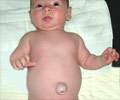A new study has revealed that kids are spending as many as two hours a day in front of television in child care settings.
Lead author Dimitri A. Christakis, MD, MPH, director of the Center for Child Health, Behavior and Development at Seattle Children's Research Institute and professor of paediatrics at the University of Washington School of Medicine, looked at frequency and quantity of television viewing for infants, toddlers and pre-school aged children.The expert found that kids in home-based settings watched significantly more on average than those in center-based daycares.
Preschool-Aged Children's Television Viewing in Child Care Settings discovered that among preschool-aged children, those in home-based daycares watched TV for 2.4 hours per day on average, compared to 0.4 hours in center-based settings.
Christakis said: "Research continues to link excessive preschool screen time with language delay, obesity, attentional problems and even aggression depending upon content.
"At the same time, studies show that high quality preschool can be beneficial to children's development. Unfortunately, for many children, the potential benefits of preschool may be being displaced by passive TV viewing. I suspect many parents are unaware of the frequency and extent of TV viewing in day care settings. Hopefully, these findings will serve as a wake up call for them."
Christakis added: "I think most parents expect their child's preschool environment to provide opportunities for cognitive stimulation, social interaction and physical activity. Television is a poor substitute for all of these.
Advertisement
The study was published in the December 2009 issue of Paediatrics.
Advertisement
RAS








